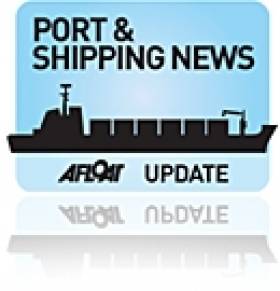Displaying items by tag: Casla Bay
Good Friday in Galway as Second Ferry is Loaded
Despite freshening winds the 169 gross registered tonnes ferry was winched out of the waters of the port's Dún Aengus Dock. In total the operation took six-hours which saw the delicate positioning of the 27m long ferry between the ship's two deck-mounted cranes and lowered onto the cargo-deck.
Yesterday proceedings to load the ferry were suspended due to delays in relocating other cargo so to accommodate the 243 passenger capacity ferry. This followed the loading of her sister Clann na nOileáin on Wednesday.
Several previous attempts to hoist the Clann Eagle I onto the deck of the Danish-flagged vessel have been hampered. At one stage due to complications in efforts to transport the vessels, the 100m Thor Gitta was temporary detained by the admiralty marshal.
Procedures to load the 29 knots fast-ferry pair have been beset with incidents notably the grounding and subsequent damage to the first chartered cargoship, Patanal, off Rossaveal. It was originally planned to sail the ferries out into Casla Bay where the German-flagged vessel would load them onboard.
As a consequence the ferries were transferred to Galway where the Clann na nOileáin did not escape attention either. On the first attempt to load the ferry one of the ship's slings snapped from the crane-cradle causing the 172 tonnes ferry to fall into the water.
Minor damage was caused to the ferry, though three men who remained onboard at the time of the incident were taken to hospital but were later released.
Last month the ferries were sold to a French buyer after the company that owned them Bád Arann Teoranta (trading as Aran Direct) went into receivership. The ferries operated on several routes between Rossaveal to the islands but are now destined to serve on an inter-island service from the Indian Ocean island.
























































